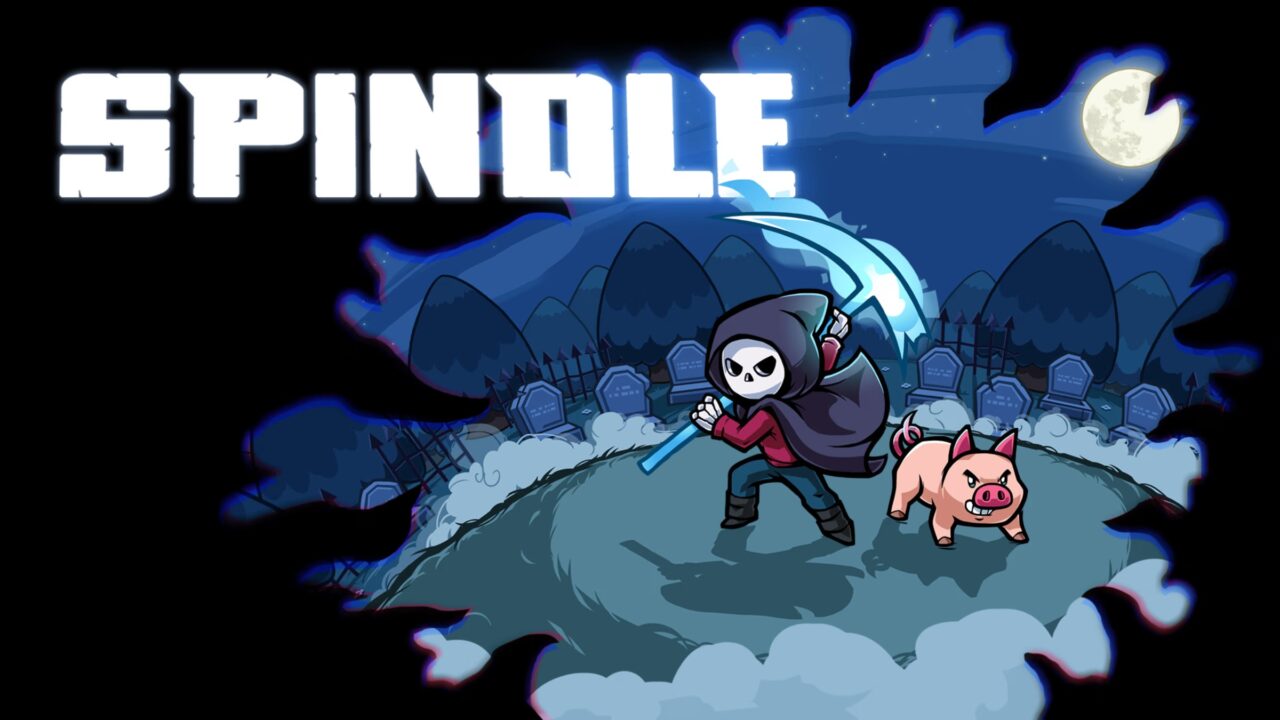Guest Review by Dragon Master Danny
From the moment you assume control of young Dengel, instantly and unexpectedly reborn as Death, the game Spindle makes its profound intentions clear. This is no typical pixel-art adventure; it is a striking and beautifully rendered meditation on mortality that feels vibrantly alive. What begins as a quiet day shatters when Dengel’s father vanishes and the boy finds himself tasked with a cosmic job. Guided by a philosophical talking pig and overseen by Charon, Dengel wields his scythe to collect lost souls, maintain the cosmic balance, and uncover the turmoil that has broken the world of the dead. This simple premise is delivered with such surprising heart, expertly setting a stage where grief and connection are intrinsically intertwined.

While drawing clear comparisons to classics like The Legend of Zelda: A Link to the Past and Tunic, Spindle chooses to prioritize meaning over discovery. Combat is simple, crisp, and purpose-driven. The scythe serves as both weapon and key, used to strike down corrupted spirits and interact with the environment. Progression is elegantly restrained: you unlock new abilities—such as a quick dash or a healing pulse—that subtly shift your perception, revealing shortcuts and secrets. Critically, there is no experience system, gold, or gear grind. You fight not for upgrades, but simply to move forward, giving every encounter a sense of focus. In a genre obsessed with statistics, Spindle stands apart by asking you to slow down and absorb its deliberate, thematic rhythm.
That rhythm is focused heavily on tone. For a game centered on death, Spindle is anything but grim. It’s often quietly funny, occasionally absurd, and constantly infused with tenderness. Developer Wobble Ghost walks a remarkable tonal tightrope, crafting writing that is quirky yet sincere. Villagers and spirits possess distinct personalities, their dialogue weaving genuine humor and deep melancholy in a single breath. One moment, you’re solving a puzzle involving mischievous chili peppers; the next, you’re helping a ghost find lasting peace. When it lands, the emotional resonance is earned through suggestion and silence, not forced exposition. However, this rhythm falters when some collected souls’ stories feel perfunctory, existing only to fill a quest log rather than illuminating the game’s broader themes, treating a passing like a mechanical plot device instead of a personal farewell.

What beautifully anchors the experience is Spindle’s immersive atmosphere. The pixel-art world is lush but restrained, utilizing a muted color palette that lends environments a feeling of perpetual dusk. Each distinct biome—from misty swamps to a volcanic city—is lovingly handcrafted. Death is rendered not as decay, but as a beautiful, quiet transition. This bittersweet essence is reinforced by the soundtrack, which drifts between gentle piano and ambient strings. While not every track is a masterpiece, the high points are evocative and understated, perfectly contributing to the game’s meditative pacing.
Gameplay remains highly accessible, featuring adjustable difficulty sliders that allow players to tailor the challenge, making it welcoming to all. Boss fights serve as mechanical highlights, focusing on pattern recognition and precise timing rather than brute force. They are essentially puzzles that reward patience and observation. Still, the game occasionally struggles with its overall pacing. The lack of any fast-travel system often leads to frequent, momentum-interrupting backtracking, stretching a narrative adventure beyond its optimal length. Furthermore, performance on the Switch, while mostly solid, presents minor stutters and load times that suggest ambition slightly outpacing resources—a forgivable, though noticeable, technical imperfection for a debut indie title.

Spindle truly finds its soul in the evolving, organic relationship between Dengel and his pig companion. What begins as comedic banter matures into the game’s emotional anchor—the essential lens through which the story’s absurdity and heart intertwine. Their simple, honest bond carries more weight than any plot twist. Ultimately, Spindle succeeds not by reinventing the action-adventure formula, but by remembering what made it timeless: exploration that feels meaningful, humor that complements heartbreak, and characters who feel entirely human. It leaves you not overwhelmed, but peacefully contemplative—a soft ache rather than a hard tear. Wobble Ghost’s debut is flawed, profoundly heartfelt, and wholly worth experiencing. It is a gentle reminder that death is not the opposite of life, but rather its echo and transition.
Disclaimer: A review key was provided

